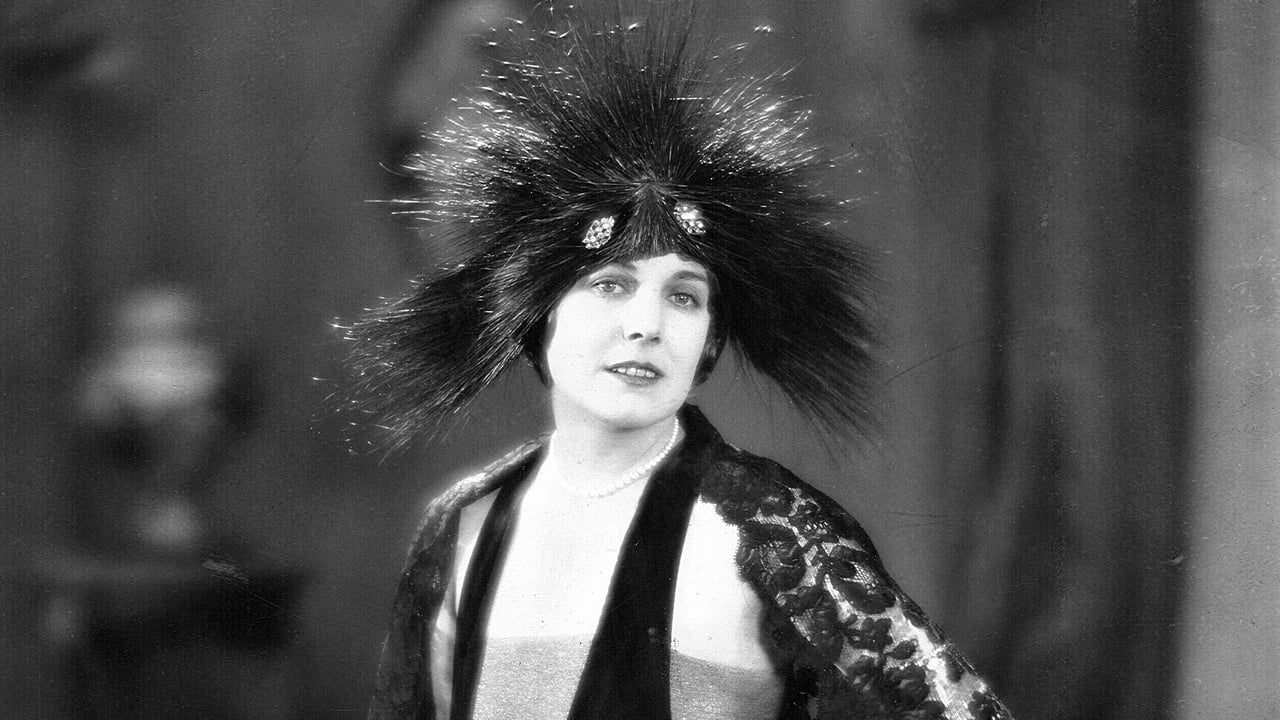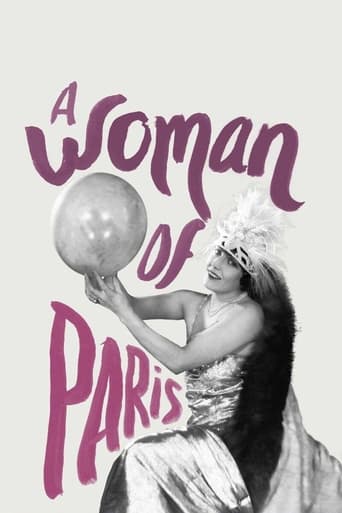ChampDavSlim
The acting is good, and the firecracker script has some excellent ideas.
Yash Wade
Close shines in drama with strong language, adult themes.
Taha Avalos
The best films of this genre always show a path and provide a takeaway for being a better person.
Philippa
All of these films share one commonality, that being a kind of emotional center that humanizes a cast of monsters.
TheLittleSongbird
Am a big fan of Charlie Chaplin, have been for over a decade now. Many films and shorts of his are very good to masterpiece, and like many others consider him a comedy genius and one of film's most important and influential directors. It is hard to not expect a lot after not long before Chaplin had one of his earliest career highs in 'The Kid'. 'A Woman of Paris: A Drama of Fate' doesn't disappoint, and it shows Chaplin having properly found his style and fully settled. As said with many of his post-Keystone efforts, it shows a noticeable step up in quality though from his Keystone period, where he was still evolving and in the infancy of his long career. The Essanay and Mutual periods were something of Chaplin's adolescence period where his style had been found and starting to settle. After Mutual the style had properly settled and the cinematic genius emerged. Very much apparent here in 'A Woman of Paris: A Drama of Fate', which may not be one of Chaplin's best but it is to me one of his most under-appreciated.It is let down by the melodramatic ending that comes over too as silly and an interpolated music score composed not long before Chaplin's death that is intrusive and doesn't fit the film. On the other hand, 'A Woman of Fate: A Drama of Fate' looks great, from Essanay onwards, and it is certainly the case here, it was obvious that Chaplin was taking more time with his work and not churning out countless shorts in the same year of very variable success like he did with Keystone. It's actually one of his technically best-looking efforts from this period.'A Woman of Paris: A Drama of Fate' is also funny and very charming, never coming over as dull and never being too over-sentimental. It features some of Chaplin's most remarkable directing of any effort of his up to this point in his career. He similarly gets the best out of his cast, with the standouts being the ever charming and quite touching Edna Purviance and especially a superb Adolphe Menjou in a star-making turn. Concluding, very well done. 8/10 Bethany Cox
evening1
This charming film easily proves that Charlie Chaplin could do serious drama if only the public would have allowed him.TCM announcer Ben Manciewicz notes that "A Woman of Paris" bombed at the box office but that couldn't have been due to the performances, which were uniformly wonderful.Edna Purviance seems an unlikely heroine -- not dazzlingly gorgeous but convincingly expressive as a woman who'd like to give herself to a troubled artist who lacks the backbone to stand up to his mother and commit.Carl Miller does well as the conflicted painter but Adolphe Menjou is wonderful as a shallow bon vivant who is more entertained by than enamored with the lovely Marie.Lydia Knott is very good in the unglamorous role of Jean's doting mother.I liked the way this film ended on an inspiring note by citing the redemptive value of giving to others -- an ageless message.Coda: Music is used to wonderful effect in this film, as in sequences in which Pierre picks up a miniature saxophone and gives it a tootle. Impressively, it was Chaplin who composed the score.
casa5678
This is an exquisite film that needs to be seen with some understanding of the era in which it was made. It was a critical success for good reason, and it's ironic style and subtle acting was a great influence on directors such as Lubitsch. It was not a popular success in the US but was well understood and acclaimed as such in Europe. I notice that some reviewers decry it as melodrama, but there is no reason why melodrama should not be an acceptable form of art. I would urge viewers to immerse themselves more in the treasures of the silent cinematic era, as there are many lessons to be learned therefrom for today's aspiring artists in any medium.
Steffi_P
Charlie Chaplin's only completely straight drama that he directed but did not star in was a flop in its day, and due to its anomalous status has not fared especially well in later years either. Nevertheless it has had its champions, like British director Michael Powell and Swedish actress and director Liv Ullmann, and is hailed in some quarters as being as sensational and innovative as his comedies.However a look at the formal style of A Woman of Paris shows much more simply an assured yet conventional grasp of film form, consistent with Hollywood production of the time. As in his comedies, Chaplin shows an intelligent handling of space and arrangement. In those early shots he gives a cramped feeling by having side walls visible up to the edge of the frame and foreground objects like the bed in Edna Purviance's room leaving little room for manoeuvre. An honourable mention goes here to the cinematography of Roland Totheroh which resembles Rembrandt lighting in all but one aspect – the slight level of clarity in the darkness (as oppose to full shadow) gives a very real feeling of squalor to those opening scenes. Chaplin also makes great use of background and foreground, minimising cuts by having multiple characters in the shot at once. Often there is emotional acting up front with physical acting out back. This is all superb, but it is hardly ground-breaking for the period, nor is it particularly surprising to anyone who has studied Chaplin's other works.The plot of A Woman of Paris too is a fairly routine melodrama, with many twists that are clichéd and hard-to-swallow. Its condemnation of the excesses of wealthy socialites could almost have been borrowed from one of Mr DeMille's moral crusades. This being Chaplin however its depictions are generally a little more sensitive and humane than the average, and while we do have that hackneyed device of a man ruined by an unfaithful woman, in this case the woman is herself a more or less innocent victim of a callous playboy, and her reasons for her lack of fidelity to one man are at least given some empathetic explanation.However, A Woman of Paris's melodrama, in spite of its formulaic structure, has a kind of truth-to-life that most other melodramas fail to achieve. Chaplin draws from his cast some steady, measured performances, free from the overt gesture and strained mugging of your typical silent picture. The emoting is clearly stated, yet it is never overstated. The wonderfully restrained Adolphe Menjou makes the best job of this, underplaying everything with a kind of suaveness which makes us believe women could be attracted to him in spite of his being a repellent bounder. Purviance is great too, always having been a competent straight woman to Charlie's funny man, now sticking to a languid pace and letting the emotions drift on and off her face. It's also nice to see Henry Bergman, probably the most professional of Chaplin's regular players, making a bit part and adding just a little note of the ridiculous without violating the drama. Amongst the other cast members, all of whom are now forgotten, no-one exactly stands out, but by the same token none of them shows themselves up with a bad job.And while, like most Hollywood pictures of the time, A Woman of Paris is a little excessive with the intertitles, Chaplin rarely uses words to give anything away. Moments such as the young artist realising Purviance has another man in her life are revealed with sequences of visual clues, giving them an incredible smoothness and forcing us to really pay attention to those subtle reactions. Then there are those little touches of genius, those moments that separate the truly great filmmakers from the merely good, such as Purviance slowing down when she encounters a gendarme after hastily retrieving her necklace. With A Woman of Paris Chaplin, with his typical mix of unpretentiousness and devoted humanism, dives shamelessly into the lowest depths of melodrama, whilst giving to that genre a sprinkling of the dignity and honesty it so often lacks.

